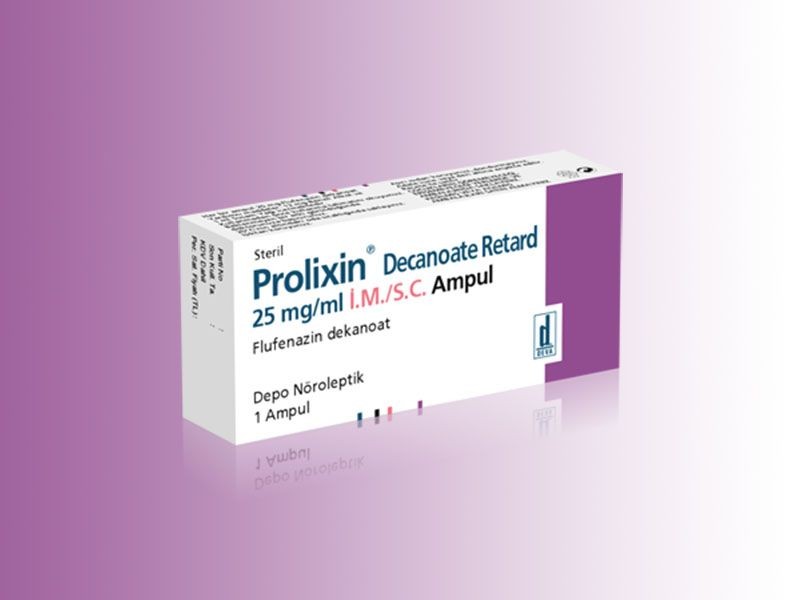
Contents
Side Effects of Prolixin (fluphenazine)
Prolixin (fluphenazine) is an older antipsychotic medication used to manage schizophrenia.
Scientists believe that phenothiazine antipsychotics work by blocking dopamine, a neurotransmitter that nerves use to communicate. They are used as a last resort when other antipsychotics fail.
Common side effects of Prolixin include extrapyramidal side effects such as abnormal muscle contractions, difficulty breathing and swallowing, neck spasms, low blood pressure, constipation, dry mouth, blurred vision, seizures, dizziness, and drowsiness.
Serious side effects of Prolixin include tardive dyskinesia, neuroleptic malignant syndrome (NMS), and increased risk of death in elderly patients with dementia-related psychosis.
Prolixin can interact with medications that affect heart rate and rhythm, such as procainamide, sotalol, amiodarone, and dofetilide. It should not be combined with other antipsychotics or medications that depress the central nervous system. Safe and effective use of Prolixin is not established in pregnant females. It should also be avoided by breastfeeding females.
Important Side Effects of Prolixin (fluphenazine)
Fluphenazine causes extrapyramidal side effects such as abnormal muscle contractions, difficulty breathing and swallowing, and neck spasms. Other side effects include tardive dyskinesia and neuroleptic malignant syndrome (NMS) characterized by fever, muscle rigidity, altered mental status, irregular blood pressure, and irregular heart rate and rhythm.
Patients experiencing severe side effects must seek medical help. Prolixin should not be used for treating patients with dementia-related psychosis.
Side Effects of Prolixin (fluphenazine) for Healthcare Professionals
Central Nervous System
The most frequently reported side effects are extrapyramidal symptoms, including pseudoparkinsonism, dystonia, dyskinesia, akathisia, oculogyric crises, opisthotonos, and hyperreflexia. These reactions can be controlled by antiparkinsonian drugs and dosage reduction.
Tardive Dyskinesia
Fluphenazine treatment can result in involuntary choreoathetoid movements affecting the tongue, face, mouth, lips, jaw, trunk, and extremities.
Other CNS Effects
Other effects include neuroleptic malignant syndrome (NMS), drowsiness or lethargy, catatonic-like state, restlessness, excitement, or bizarre dreams.
Autonomic Nervous System
Hypertension and fluctuation in blood pressure have been reported. Hypotension is rare but can occur in certain patients. Severe hypotension should be treated with intravenous vasopressor drugs. Other autonomic reactions include nausea, loss of appetite, salivation, polyuria, perspiration, dry mouth, headache, constipation, blurred vision, glaucoma, bladder paralysis, fecal impaction, paralytic ileus, tachycardia, and nasal congestion.
Metabolic and Endocrine
Weight change, peripheral edema, abnormal lactation, gynecomastia, menstrual irregularities, false results on pregnancy tests, impotency in men, and increased libido in women can occur.
Allergic Reactions
Skin disorders such as itching, erythema, urticaria, seborrhea, photosensitivity, eczema, and exfoliative dermatitis have been reported. Anaphylactoid reactions may also occur.
Hematologic
Routine blood counts are advisable as blood dyscrasias including leukopenia, agranulocytosis, purpura, eosinophilia, and pancytopenia have been observed.
Hepatic
Cholestatic jaundice may occur and treatment should be discontinued. Increased cephalin flocculation has been reported without clinical evidence of liver damage.
Others
Sudden, unexpected deaths have been reported in hospitalized psychotic patients. Phenothiazines can cause sudden flare-ups of psychotic behavior patterns shortly before death. Adverse reactions also include systemic lupus erythematosus-like syndrome, hypotension severe enough to cause fatal cardiac arrest, altered electrocardiographic and electroencephalographic tracings, altered cerebrospinal fluid proteins, cerebral edema, asthma, laryngeal edema, angioneurotic edema, skin pigmentation, and lenticular and corneal opacities.
Drug Interactions with Prolixin (fluphenazine)
No information provided.
Summary
Prolixin (fluphenazine) is an older antipsychotic medication used to manage schizophrenia. It can cause extrapyramidal side effects and has potential interactions with other medications. Safe use of Prolixin is not established in pregnant or breastfeeding females.


